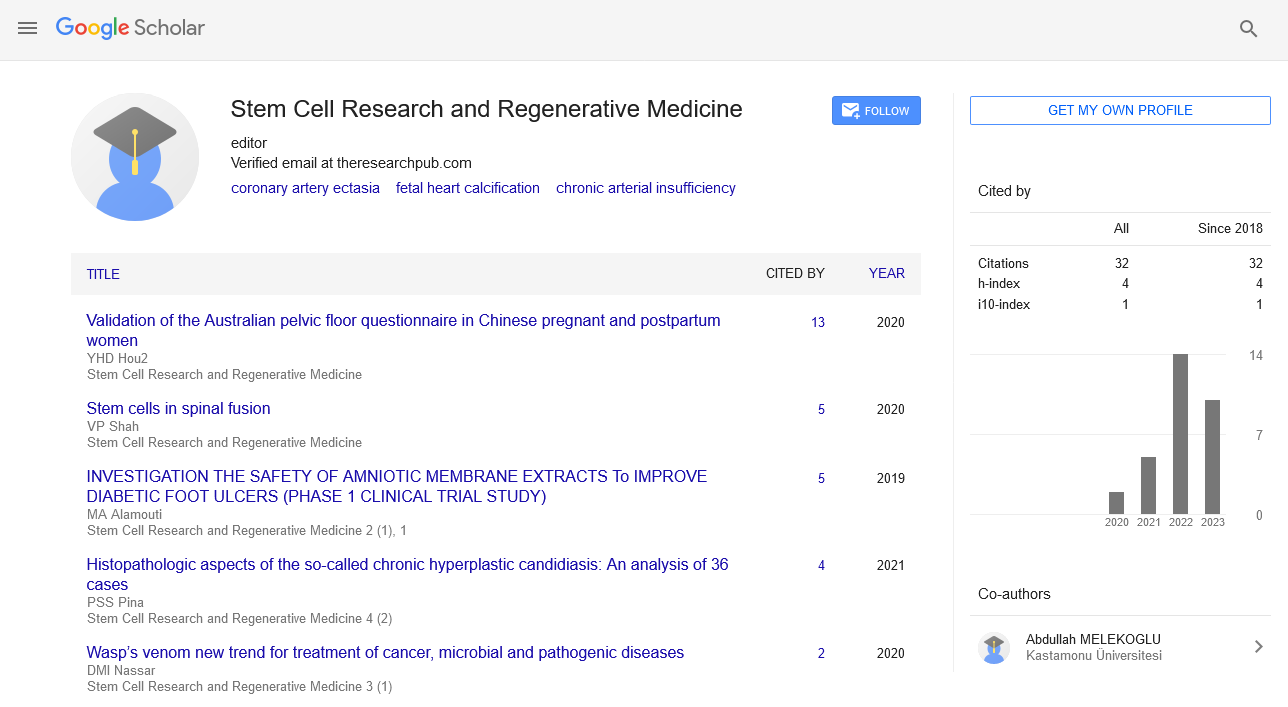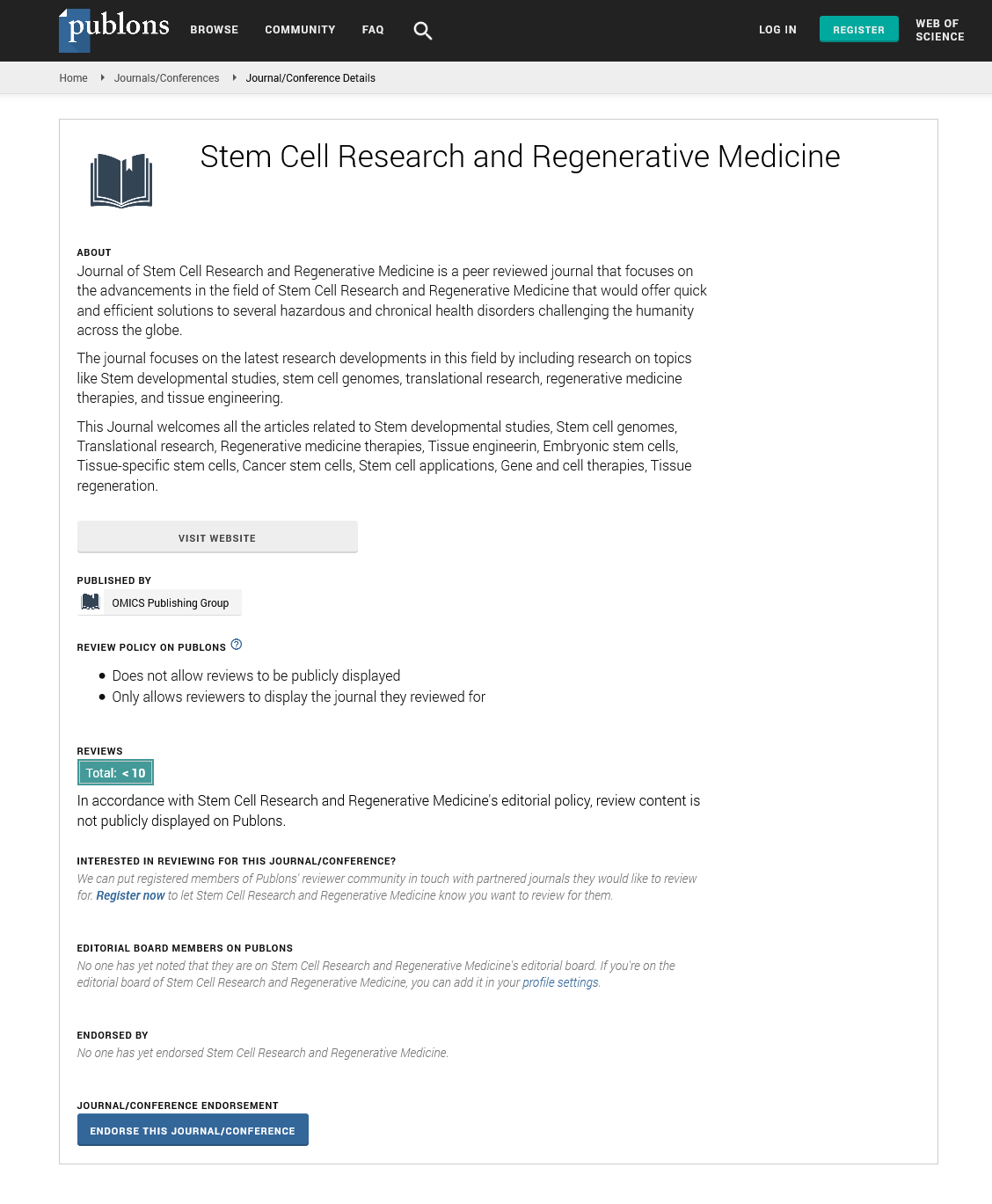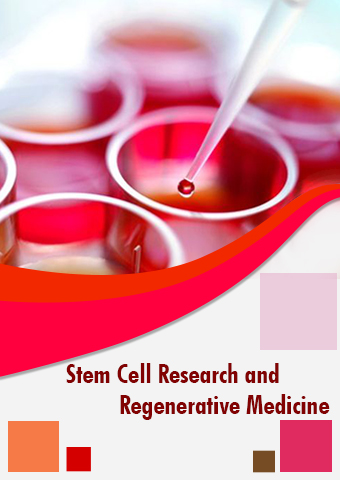Perspective - Stem Cell Research and Regenerative Medicine (2023) Volume 6, Issue 5
The Promise and Potential of Stem Cell Research
- Corresponding Author:
- Fereshteh Esfandiari
Department of Biotechnology, University of Kurdistan, Iran
E-mail: fereshesfandiari@royaninstitute.org
Received: 19-Sep-2023, Manuscript No. SRRM-23-119109; Editor assigned: 22-Sep-2023, Pre QC No. SRRM-23-11909 (PQ); Reviewed: 05-Oct-2023, QC No. SRRM-23-11909; Revised: 12-Oct-2023, Manuscript No. SRRM-23-119109(R); Published: 19-Oct-2023, DOI: 10.37532/SRRM.2023.6(5).125-126
Introduction
Stem cell research has emerged as one of the most promising and revolutionary fields in modern medicine and biology. Stem cells possess the unique ability to develop into various cell types, making them a vital resource for regenerative medicine, disease modelling, and drug discovery. This paper explores the diverse applications and ethical considerations of stem cell research, highlighting its potential to transform healthcare and scientific understanding.
Description
Types of stem cells
Stem cells can be broadly categorized into two main types: Embryonic Stem Cells (ESCs) and Adult Stem Cells (ASCs). ESCs are derived from the inner cell mass of early-stage embryos and have the potential to differentiate into any cell type in the human body. In contrast, ASCs are tissue-specific and have a limited differentiation capacity, primarily giving rise to cell types within their tissue of origin.
Medical applications
Regenerative medicine: One of the most promising applications of stem cells is in regenerative medicine. Stem cell-based therapies have shown great potential in repairing damaged tissues and organs, offering hope for patients suffering from conditions such as heart disease, spinal cord injuries, and diabetes. For instance, stem cell-based cardiac tissue regeneration has shown substantial progress in restoring heart function after a heart attack.
Disease modelling: Stem cells also play a crucial role in disease modelling. By generating patientspecific induced Pluripotent Stem Cells (iPSCs), researchers can recreate disease-specific cellular models in the laboratory. These models enable a better understanding of disease mechanisms and the development of targeted therapies. iPSC-based models have been particularly valuable in studying neurodegenerative disorders like Alzheimer’s and Parkinson’s disease.
Drug discovery: Stem cell-based assays have revolutionized drug discovery and development. These assays allow researchers to test potential drug candidates on human cells, providing a more accurate representation of how drugs will behave in the human body. This not only speeds up the drug development process but also reduces the reliance on animal testing.
Embryonic stem cells: The use of embryonic stem cells has been a topic of ethical debate due to the destruction of human embryos during their extraction. This debate has led to restrictions and regulations in many countries. To address these concerns, alternative methods, such as generating iPSCs from adult cells, have been developed, reducing the ethical dilemmas associated with ESCs.
Cloning: Cloning, particularly therapeutic cloning, has raised ethical concerns related to the creation of embryos for research purposes. While therapeutic cloning offers the potential to create patient-specific stem cell lines for personalized medicine, it remains a subject of debate, with various countries banning or heavily regulating this practice.
Current challenges
Tumorigenicity: A significant challenge in stem cell therapy is the risk of tumorigenicity. When transplanted, undifferentiated stem cells can form tumors, limiting their clinical application. Researchers are actively working on methods to control the differentiation of stem cells and ensure their safety for therapeutic use.
Immuno-compatibility: For allogeneic stem cell transplantation, ensuring immunocompatibility between donor and recipient is crucial. Immune rejection remains a concern, and advancements in immune modulation and tissue engineering are being explored to address this challenge.
Scalability and cost: Scalability and cost-effectiveness are critical considerations for the widespread use of stem cell therapies. Manufacturing processes need to be optimized to reduce costs and ensure that these therapies can reach a broad patient population.
Future directions
The future of stem cell research is promising, with on-going developments in various areas:
Gene editing: Advancements in gene editing technologies, such as CRISPR-Cas9, hold great potential for enhancing the precision and safety of stem cell-based therapies. These tools allow for precise modification of stem cells to correct genetic mutations or enhance their therapeutic potential.
3D bio-printing: 3D bio-printing enables the creation of complex tissue structures using stem cells. This technology has the potential to revolutionize tissue engineering and organ transplantation by allowing the generation of customized, functional tissues.
Personalized medicine: Stem cell-based personalized medicine is on the horizon. The ability to generate patient-specific stem cell lines for therapy or drug testing can lead to more effective and tailored treatments for various conditions.
Conclusion
Stem cell research continues to be a transformative field with remarkable potential to revolutionize healthcare, disease understanding, and drug development. While ethical concerns persist, ongoing advancements in stem cell biology and technology are addressing many of these challenges. The future of stem cell research is promising, and its applications are poised to make a significant impact on human health and scientific knowledge.


